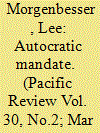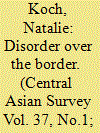| Srl | Item |
| 1 |
ID:
151445


|
|
|
|
|
| Summary/Abstract |
This paper explains how authoritarian regimes employ flawed elections to obtain both short-term legitimacy and long-term stability. In conjunction with the use of co-optation and repression, it argues that ruling parties hold de jure competitive elections to claim what is termed autonomous legitimation. This denotes the feigning of conformity to the established rules of the constitution and the shared beliefs of citizens. Regardless of overall turnout and support, ruling parties exploit the normative and symbolic value of elections in order to establish moral grounds for compliance within a dominant-subordinate relationship. In support of this argument, the case of Singapore's People's Action Party (PAP) is analysed in historical and contemporary terms. Since 1959, the PAP has used precisely timed elections to extract one or more mandate types from citizens and, by extension, claim legitimacy. In particular, it has sort a mandate based on its response to an event, execution of a policy and/or collection of a reward. In the long run, autocratic stability has been achieved through a process of reciprocal reinforcement, which has combined autonomous legitimation with targeted co-optation and low intensity coercion. The paper concludes by addressing the generalisability of this finding for other authoritarian regimes in Southeast Asia.
|
|
|
|
|
|
|
|
|
|
|
|
|
|
|
|
| 2 |
ID:
159214


|
|
|
|
|
| Summary/Abstract |
Across Eurasia, authoritarian leaders have sought to justify their ‘strong-hand’ approach to government by framing instability as a security threat and the strong state as a guarantor of political stability. Such ‘regimes of certainty’ promote a modernist valorization of order, the flip side of which is a demonization of political disorder instability, or mere uncertainty. Examining the spatial and temporal imaginaries underpinning such narratives about in/stability in Central Asia, this paper compares official discourse in Kazakhstan and Uzbekistan, where state-controlled media and official publications have stigmatized political instability in Kyrgyzstan as indicative of the dangers of political liberalization and a weak state. Ostensibly about the ‘other’, these narratives are also about scripting the ‘self’. I argue that official interpretations of ‘disorder over the border’ in Kyrgyzstan are underpinned by a set of spatial and temporal imaginaries that do not merely reflect regional moral geographies, but actively construct them.
|
|
|
|
|
|
|
|
|
|
|
|
|
|
|
|
| 3 |
ID:
151520


|
|
|
|
|
| Summary/Abstract |
How are global human rights localised in authoritarian societies? How and what human rights discourses are mobilised by indigenous peoples to further their demands? Building upon original fieldwork among Nubian activists in Egypt, this article explores the complexities regarding human rights framing through a discussion of recognition of Nubian indigeneity. The article finds that the history and political experience of Egypt’s Nubians bring about diverging opinions and also limitations as to how, and what, human rights frameworks rights claimants and their supporters are to employ. It argues that Egyptian nationalism not only affects how Nubian activists mobilise in general, but also helps explain the very limited appeals to a global discourse of human rights.
|
|
|
|
|
|
|
|
|
|
|
|
|
|
|
|
| 4 |
ID:
192144


|
|
|
|
|
| Summary/Abstract |
US President Joe Biden’s foreign policy, as expressed in the 2022 National Security Strategy, represents a contemporary variation of the Truman Doctrine, the Marshall Plan and the post-Second World War programme of US global leadership. It frames great-power politics in the international arena and democratic revitalisation at home as part of a broad ideological confrontation between liberal-democratic capitalism and illiberal, authoritarian nationalism. It directs an economic-recovery plan inward to rebuild the US economy after the distortions it has been experiencing since 2008. And it promotes US leadership of the liberal-international order, albeit in a different geopolitical environment than prevailed in the post-war years. This strategy has been refined in the face of near disaster and revived by the Russian invasion of Ukraine in February 2022.
|
|
|
|
|
|
|
|
|
|
|
|
|
|
|
|